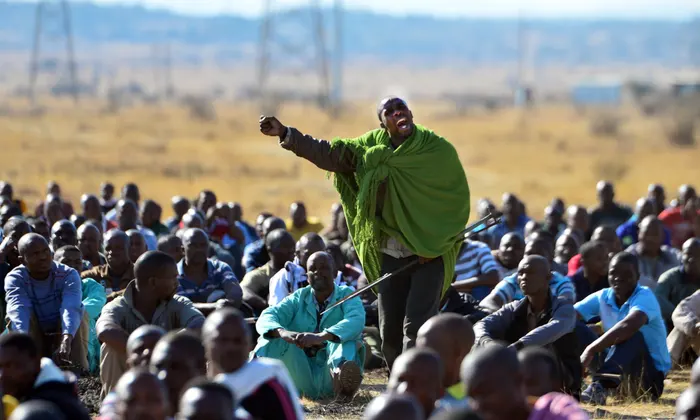In August 2022, South Africa commemorated the 10th anniversary of the Marikana Massacre. On 16th August 2012, the South African police shot laborers at the Marikana platinum mine which in turn resulted in 34 deaths and over 78 people were injured

Marikana, which was formerly known as Rooikoppies, is a town in the Rustenburg local municipality in the Bojanala Platinum District Municipality district in the North West province of South Africa. It is one of the richest mineral belts in the world. The United Kingdom-based Lonmin group owns the mine.
Around 3,000 black miners had been protesting for over a week due to their poor living and working conditions, poor wages, and multiple other problems. They were joined by workers from other industries, such as iron, ore, etc. They were united by a common plea.
Despite having no support from the National Union for Workers (NUM) they continued their strike which was soon labeled as a wildcat strike. A wildcat strike refers to a protest where the union workers independently take action when their demands are not being heard, without the assistance or the authorization or approval of the Union leadership.
The situation worsened because of the tension that had built up between the workers and the Union. The Union paid no attention to the plea of the workers and their families.
Marikana police shooting

The Union ignored the protests they were conducting and what contributed to the ongoing tension was the death of two fellow miners which added to the anger that was building up inside them.
By August 16th the number of casualties increased. During the strike six miners were killed, two police officers and two security guards. Due to tensions that arose between the workers, some police and security guards were hacked to death.
Hostility among the workers also arose which led to the death of four miners at the hands of their co-workers because they broke the strike. The massacre claimed over 60 lives.
The Lonmin Administration announced the suspension of the mines production on 14th August. In response to this the miners set up camp as a protest on a hill called Wonderkop. The strike continued with persistence until a direct attack was launched against them.
The police conveniently protected themselves by saying that the attack had drifted into violence long before they stepped in. The miners who were now furious were carrying arms heading towards where the police were and in response to this the police tried to disperse the crowd to save their own lives and in this process 34 people were killed.
The Marikana police shooting will always be one of the most horrifying and violent atrocities committed in history. This incident is one of the perfect examples of brutality committed by the police against the poor. The labourer killings brought widespread political unrest.
There have been many such killings scattered throughout history which have been primarily connected to the Apartheid Era.
Marikana was much more than a racial conflict. It was a struggle between the nations wealthy and the poor. It wasn’t the revival of Apartheid but more a continuation of its toxicity of it. This incident exposed the rainbow nation’s chimera.
Economic Freedom Fighters (EEF) is an organization that was launched as a champion of the poor. It is an important stakeholder in African politics. Other organizations came up such as the Fees Must Fall and Rhodes Must Fall campaigns which revealed the inability of the African National Congress (ANC).
Even though investigations were conducted into the killings no one has been held responsible for them. The families of those affected have received over Rs.70 million from the State as compensation. There has however been no response to the constitutional damage requests.
Conclusion

The dissatisfaction towards the government has increased considerably throughout the years due to the failure of meeting the necessities of the laborers. Some of these include proper wages, housing facilities, water energy, public infrastructure, and unfavorable working conditions.
The deaths of the laborers in Marikana were a result of a factor that is deeper than the skin color of the people working the mine.
It was the outcome of a social issue that has been so deeply ingrained. It was caused by the failure of a Trade Union to admit their incompetence and accept responsibility. Poverty, inequality, and unemployment are major causes of the shootings.
Read More: South Africa: ANC splits widen as members participate in a protest against Ramaphosa












